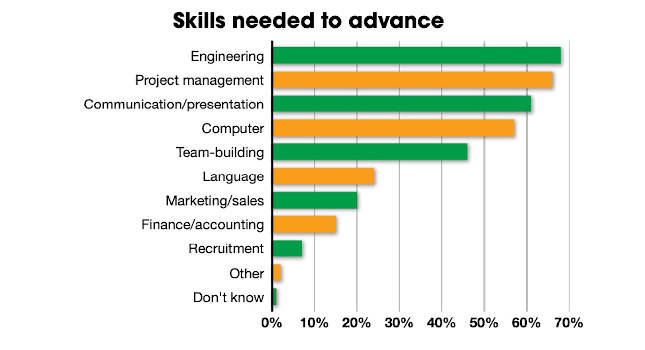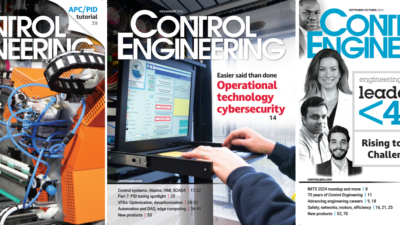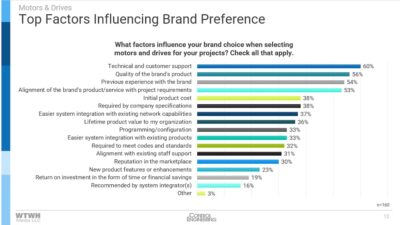Respondents to the 2021 Control Engineering Career and Salary Survey research provided related advice, and education was the most-offered of six topics.

Education advice was most plentiful (64 replies) when respondents to the 2021 Control Engineering Career and Salary Survey were asked to contribute “engineering career-related advice” to others. The next five categories of advice were in a statistical dead heat in numbers of replies, ranging from 53 to 50: Communication, attitude, workplace strategies, engineering tips and project management. “Other” topics, many of which could also have fit into one of the other six, numbered 20.
See related article in the May Control Engineering print and digital edition, with more information online. The 2021 Control Engineering research resulted from an emailed survey to subscribers, producing 151 qualified responses from March 26 to April 5, for a margin of error of +/-8.0% at a 95% confidence level.
A sampling of advice in four categories follows, lightly edited for grammar and redundancy. Bold shows some highlights and recurring themes. Some advice is conflicting, since life experiences differ widely.
Education: Engineering career-related advice
A master’s degree is essential.
After you graduate from college, don’t stop learning. Take classes, attend webinars and read blogs, magazines, etc.
Always keep learning by reading new books.
Associates degree in electronic and computer science
At least 4 years
At least get a bachelor degree
Bachelor degree is a must
Bachelor required
Bachelor of science in engineering
Chemical engineer
Classical education
College education does help but is not required.
College/trade school
Complete your education!
Computer science-based education
Continue getting education
Continue to learn. Get certified in as many subject matters areas as possible.
Continuously learn, always have something that you are pursuing.
Cybersecurity
Develop marketable skills; even consider trades or technical schools.
Develop strong problem-solving skills.
Education is important but knowledge is more important.
Engineering – computer technology
Every day is a learning opportunity. Do not get complacent especially early on.
Find employment willing to pay for training and higher degrees.
Four-year degree is necessary.
Get a bachelor degree.
Get a solid practical engineering education.
Get all the education you can.
Get an education commensurate with the job you want to get.
Get as much education as you can get and keep getting.
Get as much math as possible.
Get engineering fundamentals.
Get masters early.
Get specialized training.
Get as much more education as you can.
Go as far as you can in your education
Have highest quality education.
Include computer programming as part of your education
Industrial engineering in manufacturing
Keep it practical; don’t go into debt.
Learn as much as possible whenever possible.
Learn as much as you can about new products, skills, and methods.
Master degree
Military or trade schools
On-the-job education
Overrated
Pick a field of engineering that is challenging to you.
Pursue self-learning.
Pursue the highest education available.
Read as much as you can.
Communication: Engineering career-related advice
Always communicate openly; be a good listener.
Assess your audience: be clear and succinct for management; be thorough for engineers.
Avoid social media; focus on relationships.
Balance
Be as clear as possible. Don’t be too concise.
Be concise and thorough, don’t take communication for granted.
Be easy to talk to.
Be a good communicator. Learn communication skills.
Be open and honest.
Be succinct
Clear and concise communication is key.
Clear and recorded communications: Keep records of agreements and changes.
Communication should be serious but flexible.
Create a personal network.
Do as much personal interaction as possible.
DO NOT operate in a closed environment; get buy-in and keep communication lines open.
Don’t argue with an idiot.
Everyone is different and operate differently. Learn how to best communicate with all members, even the ones that may be the most difficult to approach
Good written and verbal communication skills.
If people don’t know what you are doing, they assume you’re doing nothing.
Keep your mouth shut
Learn as many skills as possible; continue to hone them.
Learn from others.
Learn how to relate to multiple audiences in THIER comfort language.
Learn to communicate with non-technical people.
Listen to others.
Listening/Learning ability
No smoke and mirrors, direct and accurate information given!
Open all avenues
People will judge you on your ability to communicate.
Practice it, a lot.
Put your phone down and talk.
Remain calm and state your case.
Spanish
This [communication] is the key to everything! Work on it!
Treat everyone equally.
Understand that we all communicate differently and be patient.
Understand, then be understood.
Workplace strategies: Engineering career-related advice
Accept change and new directions.
Always make improvements.
Always have different strategies.
Automation
Be a good listener.
Be a team player: positive, helpful, thoughtful.
Be good at what you do first!
Be humble, diligent and effective.
Be kind.
Be open at work but guarded; watch what you post on social media.
Be team oriented.
Be the “go to” person for something. Work well in a team.
Become indispensable.
Collaboration
Communication and safety are key.
Cross train.
Develop and use people skills.
Discover what nobody wants to do and become a specialist in that.
Don’t be afraid to push the team to be open about concerns.
Don’t anger people right away.
Efficiencies/productivity/quality
Find a way to excel at whatever you do.
Find someone to compete with. Iron sharpens iron.
Flexible work from home (WFH)
Help wherever you can, even outside your area.
Invest in yourself.
Learn everything/cross train.
Learn how to be emphatic and considerate to others.
Logistics engineer
More digital
Network with others.
No one place is the same.
Observe.
Respect others.
Safety first.
Stay connected.
Stay positive.
Surround yourself with those that have good ideas.
Teamwork; be the hub, not just a spoke in the wheel.
There is no company loyalty: Have plans to promote out or laterally change now and then.
Under-promise and over-deliver.
Very important to develop workplace strategies
Work as a team.
Work hard.
Work on it as if you own it.
Work together.
Attitude: Engineering career-related advice
Accept changes.
Always be positive.
Always smile; go elsewhere if bosses are jerks.
Always speak the truth and back that up with actual facts.
Always willing to learn new things
Attitude is everything.
Be a go getter.
Be communicative with others.
Be flexible.
Be honest and humble.
Be open minded; embrace change; complete new challenges.
Be patient and understanding with others.
Be positive and humble.
Be positive, but occasionally make time for you when frustrated.
Be positive. Learn from mistakes. Own them. Don’t cover them up.
Calmness always even under pressure
Can do attitude
Come to work ready to work; check your outside life outside.
Develop a thirst for knowledge and improvement
Don’t be the victim; always look for what you could have done differently; own your failures; own your successes.
Don’t fix it if it is not broken.
Don’t sweat the small stuff.
Enjoy what you do.
Every day is a new day. Don’t bring yesterday’s problems into today.
Everyday learning
Focus on actions and behaviors, not just results and output.
gratitude is the attitude that affects the altitude of living
Hard working and collaboration
Have a can-do spirit
Have a desire to succeed.
Have a positive mental attitude.
Humble
Keep a positive attitude even in challenging times.
Keep positive always.
Learn about perception versus reality.
Listening/learning ability
Never say: It’s not my job.
Positive attitude
Reflect positivity, gratitude and confidence but remain humble.
Stay positive
Stay positive and open to everything.
Stay positive; you have the power to choose your path.
Engineering tips, career-related advice
Always follow the facts.
Always get someone else to take a look at your calculations and/or designs prior to implementation or client review.
Always keep an eye on global trends and try to adopt latest innovations specific to your work domain.
Always look at core problem and engineer solutions to solve that problem first
Appreciate and encourage coworkers.
Ask other experts.
Be disciplined and thorough.
Buy new, don’t retrofit.
Continuing education
Design
Don’t be afraid to ask for help, but also don’t be afraid to take steps on your own.
Do it fine the first time.
Enjoy what you’re doing
Fault finding
Get as much time in front of customers as possible.
Hands on problem solving/technical skills
If it does not make sense using basic engineering principles, it may not work out at all.
Keep the solutions simple to use or the end user will not use them. Get their input!
Keep up on the new; regularly circle back to the basics; keep your math skills sharpened.
Keep your technical skills fresh.
Learn from senior engineers
Learn how to identify the true root cause.
Learn new skills every month.
Learn to code/program.
Materialize ideas.
Pay attention and learn as much as possible
Perform actual trouble shooting; do not take the shotgun approach.
Read the manual/download.
Run away from routine.
School
Simplification is key. Double check your work to be sure it makes sense.
Speed up things.
Spend at least an hour a day learning something technical and new.
Stay current by learning new programming languages.
Stay open minded.
Strive to learn from mistakes.
Strong mechanical background
Study to improve
Study/refresh, learn new technologies
The search for the best value may cost more than you may save.
There are always opportunities for improving products/processes/systems.
Think before speaking.
Think outside the box.
Try something without fear of failing.
Use every bit of your knowledge, but let your instincts lead your way.
Use low-cost personnel
When in doubt, figure it out.
Work smarter.
Work with peers and vendors to learn the best methods.
Project management: Engineering career-related advice
A well-planned project will manage itself.
Adapt your project language and style to the latest buzzwords of senior management.
always be available to assist production with questions, advice, or concerns
Anticipate that problems are going to happen.
Assist.
Be detail oriented.
Be on time and on budget 100% of the time.
Be prepared for things to not go correctly.
Closely communicate with customer
Confront issues as soon as possible to minimize the size and impacts of those issues.
Cost consciousness
Determined
Documentation is key!
Establish clear goals; be organized, on budget, and on time, realizing timelines may move.
Even starting out as an entry level engineer, understand that you are the project manager of your own work.
Excellence is mundane. Have or learn the right tools, apply them regularly and consistently. Take every step.
Experience
Find a university program that incorporates project management into the engineering programs.
Get qualified.
Improve your knowledge base.
Increase personnel for more throughput.
It will pay to learn how the other departments at your company work.
Keep it all in line all along.
Keep it simple.
Know/learn how to manage your job tasks.
Learn how to do project management.
Learn to juggle multiple projects at once.
Listen to your team and delegate well and follow up.
Look at the bigger picture!
Maintain schedules and include changes as they occur to better plan the next project.
Make a difference.
Maximize work flow efficiencies.
Meticulous
Never allow management to cut your time estimates in half.
Organization is key.
Plan for everything – plan it multiple times.
Project management skills are critical for a successful engineer.
Promises must be kept.
There will always be someone that knows they can do it better. Just be yourself.
Track all work and progress. Use sharable software to track daily progress and sharable project tracking software for tracking long-term projects.
Use a calendar and stick to your plan.
Useful skills in project management can be applied to many diverse applications.
Vital to get things done.
You can do more projects in between the work you have if you can use software tools to help, including email, calendars and lists.
Other advice: Engineering career-related advice
Always be on time!
Always have a vision of what you want to accomplish!
Be cognitive in changes in the business environment.
Be honest.
Don’t be afraid to ask your biggest critic for help. If they help, they share their own future criticisms.
Don’t deliver undeserving praise to get ahead. Let your work advance your career.
Learn to be flexible but firm in holding others accountable.
learn to merge.
Life is good.
Mentor others
Network with others in industry.
Point more safety regulations inspections.
Positive attitude
Questions: Ask often but listen to the answer and remember.
Take pride in what you do and continue learning.
Take total ownership of your growth, training, and value proposition. Don’t rely on your management to make the best decisions on your career. Only you can do that.
Team work is very important.
Treat people with kindness even if it sometimes is hard to do.
Data via Amanda Pelliccione, CFE Media and Technology research director; Edited by Mark T. Hoske, content manager, Control Engineering, CFE Media and Technology, [email protected].
———–
Miller Resource Group, an executive recruiting firm for industrial technology and food and beverage, sponsored the research.
———–
KEYWORDS: Engineering career advice, engineering career research
Don’t stop learning, after you graduate from college.
Establish clear goals; be organized, on budget and on time, realizing timelines may move.
Own your growth, training and value proposition.
CONSIDER THIS
What advice when applied can accelerate your engineering value?



